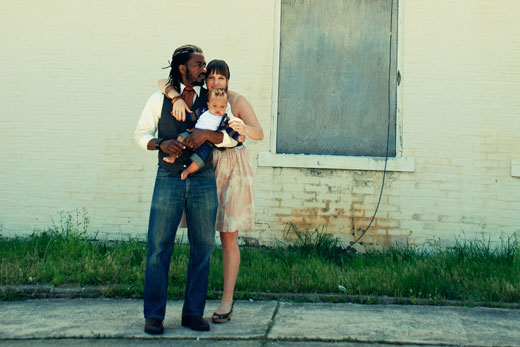A community photography project created by Carlton Mackey, director of Emory's Ethics and the Arts Program, to celebrate the spectrum of differences within modern American families has been awarded a 2014-2015 "Ideas Challenge Grant" by One Region Atlanta.
"Typical American Families" is an online platform exploring a wider view of American families through photographic images.
This month, Mackey's project was among four applicants selected to receive an Ideas Challenge grant award from One Region Atlanta, an initiative of the Community Foundation for Greater Atlanta.
In their application, Mackey and his creative partner, international photographer/photoculturalist Ross Oscar Knight, proposed utilizing their "Typical American Family" platform to help bridge faith and culture in Atlanta by creating a traveling photo exhibit.
The $2,500 grant will be used to offer free family portrait sessions with Knight to about 15 Atlanta families. Copies of those photographs will be given to each family and will also be displayed through a traveling exhibit, which will be unveiled in spring 2015 in a ceremony and public gathering at Emory's Center for Ethics.
Participating families will be invited to the event to share a multicultural meal and engage in community dialogue. Families who are interested in an opportunity to be photographed and featured in the exhibit are encouraged to apply online by Dec. 20.
"The aim is to bring people together to cultivate a deeper appreciation for diversity," Mackey says. "Through unique transformative encounters with others, I think we learn more about ourselves."
"If we see ourselves in others and see 'difference' as something to be appreciated, we'll be living in a world that is more of a community," he adds.
What does your family look like?
The idea behind "Typical American Families" was inspired by Mackey's ongoing work on "Beautiful in Every Shade," a grassroots empowerment campaign that celebrates the breadth and depth of beauty in every human being.
That campaign grew out of "50 Shades of Black," a multi-media art project launched by Mackey in 2013 — and funded in part by a grant from Emory's Center for Creativity & Arts — that explores the intersection of skin tone and sexuality in the shaping of identity through images and personal narrative.
"What really inspired my work with '50 Shades of Black' were questions around my own identity and the formation of my family's identity, with an emphasis on the way in which racial identity is formed and questions I had around biracial identity approaching the birth of my son," explains Mackey, whose wife, Kari, is white.
Shortly after the launch of "50 Shades of Black," Mackey created the "Typical American Families" website, featuring photographs of his own family. The project, he says, is "all about celebrating a spectrum of identity and family makeup in American families — and there is a spectrum in this country, just as there is within my own family."
"Thousands of interracial couples emerged and were vocal about the appreciation they had for something as simple as being identified and celebrated," Mackey says.
But interracial and biracial families aren't the only "non-normative" relationships in America, he notes. "The fabric of the American family is ever-changing, not only couples but so many variations that are still families working to live and be and advocating for their rights."
"Those are families, too — people who are the backbone of our society but are not always celebrated," he says.
Exploring life beyond the stereotypes
To date "Typical American Families" has showcased families with multiple racial, religious and cultural identities, as well as same-sex couples and their families, parents raising adopted children or children with a spectrum of disabilities, and couples in non-romantic relationships raising children together.
"All these scenarios make up who we are, and are worthy of celebrating and exploring and investigating and demystifying, removing the stereotypes that hover over each of them," Mackey says.
"What I've learned being in an interracial relationship is there are these mystifying stereotypes, an exoticism that is perceived with relationships like mine," he adds. "In reality, in most cases, that's certainly not how the couple see themselves. And that's partially because they are never seen as 'normal.' They're always seen as 'other.'"
"It's also about re-imagining some of our narrowly held, normative understandings of what an American family can be and what one should look like," he adds.
Mackey views the project title, "Typical American Families," as a bit of wordplay. "Those three words are actually questions: What is typical? What is American? What is family?" he explains.
"The project doesn't exclude any form of family — it may include any group of people working to live and be and create family," he says.
Mackey's project was chosen from among 165 proposals submitted to the 2014-2015 Ideas Challenge Grant, according to Lesley Grady, senior vice president of the Community Foundation for Greater Atlanta, which works to build a more inclusive region by providing civic engagement and community building opportunities that connect metro Atlanta residents of all cultural and faith backgrounds.
After a rigorous evaluation process, the top 12 finalists participated in a workshop with community leaders to fine-tune their ideas. Six finalists were then selected to post 90-second YouTube videos about their projects, which were voted on by the viewing public.
Other 2014-2015 Ideas Challenge Grant winners include Babba Jaden, "Faiths Enlightened"; Jody Briggs Leonard, "Celebrating Culture Through the Arts"; and Shannon Willow, "Clarkston Art Collaboration."

